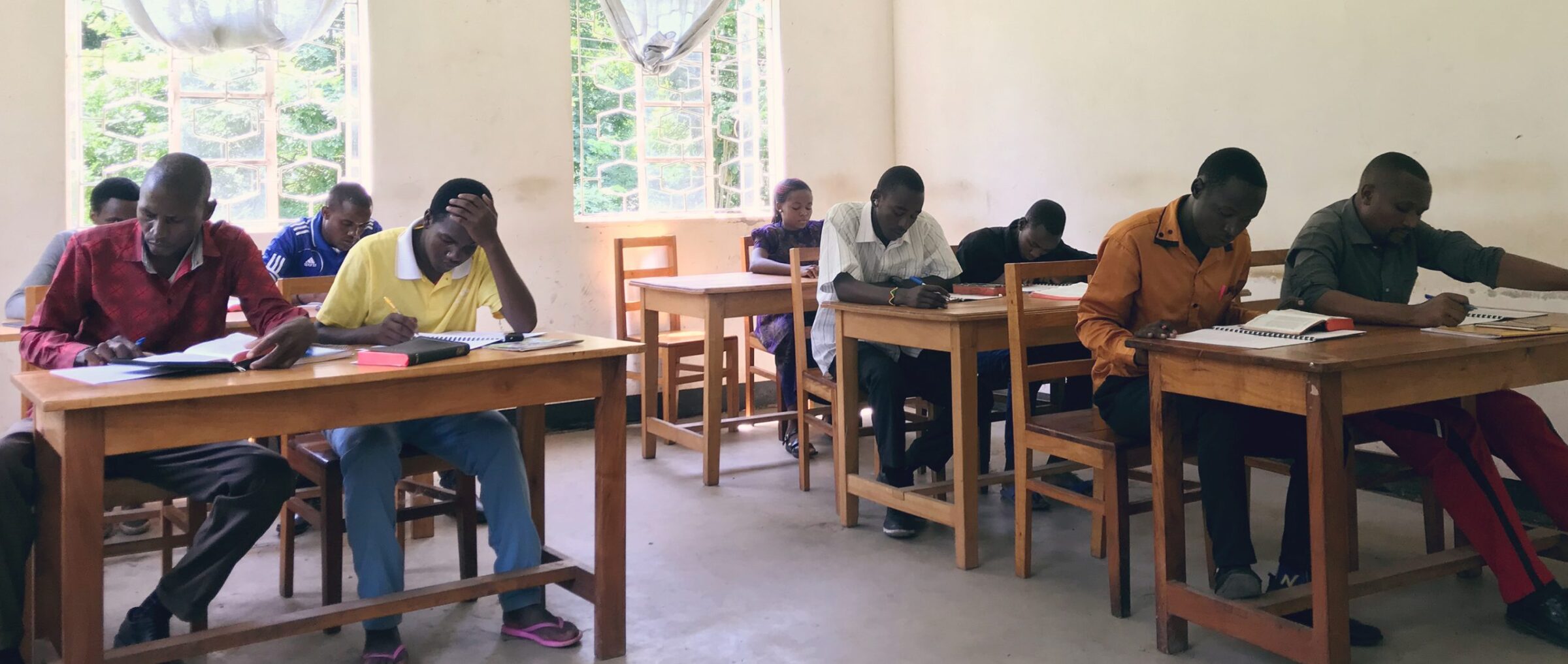Equipped by grace
CMS missionaries Mike & Katie Taylor work at Munguishi Bible College, in Tanzania, where they help explain God’s grace and equip ministry workers to teach the gospel. Here Mike shares how this work helps front-line evangelism in Tanzania.
One of the most stunning things I’ve seen in all our time in Tanzania was watching two of our students preach the gospel together to a small group. Meshaki one of our students, preached in Maasai and Musa translated into Swahili—except when Meshaki switched into Swahili—at which point Musa seamlessly switched to Maasai.
More challenges than just language
But Meshaki and Musa face many greater challenges in evangelism than language. They tell me of physical persecution and issues of shame, because becoming a Christian can mean losing one’s place in community—particularly for men. Perhaps the weightiest challenge is what Meshaki told me the other day: that it’s only at our Bible college that he has heard about grace.
In addition, our students at Munguishi Bible College love evangelism, but some know very little about Jesus.
Here’s one example. A new class arrived ready to learn. My wife Katie had prepared herself to try and teach The Mark Drama as a tool for evangelism. The Mark Drama does what the name suggests—present the gospel of Mark in dramatic form.[1] She opened by asking what the students could remember about Jesus. Collectively the class came up with just two stories: that he opened the eyes of a blind man using mud, and that he hit a rock and water came out. Since this infamous rock-hitter was in fact Moses, Katie quickly realised that the Mark Drama might not be achievable this semester!
We have learned that when students arrive at college, our first job is often to help them to know, understand and share who Jesus is and what grace means. So instead of The Mark Drama Katie worked with the students on memorising and telling stories about Jesus from Mark’s Gospel. This has been a huge help to these students. Just imagine — a group of Maasai gathered around a student, Aroni, who has been taught by Katie. He shows them the pictures of Jesus’ life and narrates stories of what Jesus did. Bible colleges like ours play an important role in teaching and sending out leaders with the tools to preach more effectively in their home communities.
Meshaki told me the other day that it’s only at our Bible college that he has heard about grace.
How gospel and culture interact
At Munguishi, as well as teaching the Bible, we seek to help our students think through how culture interacts with the gospel. Having been at Munguishi for 10 years, we are now starting to get a better feel for these cultural influences, and how to help our students understand them from a biblical perspective.
For instance, in our location many churches get the loudest speakers they can afford and then they preach and have their choirs sing at full volume. Our students count this as evangelism and it is important to them. So one wet Tuesday night I stood in a small storeroom-church and proclaimed the good news of Jesus Christ, so that a large part of Arusha’s inner city could be blasted with my own broken Swahili. I worry that this method of evangelism is intrusive and alienating, but my students rejoice that so many have been blessed by hearing God’s word. At college, we can talk thoughtfully about what evangelistic methods might work well or better.
The gospel and traditional spirituality
At college we also consider how traditional spirituality affects our approach to the gospel. We discuss how concepts like sin, blessing, grace, and eternal life interact with African beliefs and practices. We have seen how grace is so absent from churches like Meshaki’s. Grace plays very little part in traditional spirituality, where curse is averted, and blessing attained by doing right things and avoiding wrong things. As we think it through together, we see how the gospel is so radical but also so easily misunderstood. It helps not just to know that we are saved by grace, but to think through how we naturally find the concept alien and lean towards works. It explains the popularity of other teachings and people’s hesitancy to commit wholeheartedly to Jesus.
Meet some of our students
Anna is one of our top students. She has learnt how to explain the gospel and wants to tell people about how God forgives sins. But as we talk she begins to wonder if people don’t really want forgiveness. It doesn’t seem that important to them. She is considering carefully what people are looking for, and how to meaningfully share the gospel message.
Rogers wrestles with the idea of a weak and shameful gospel. How can this be a message that brings power and blessing to people’s lives? How can he show the real gospel has real power to change lives?
Emanueli underlines Galatians 3:10–14 in his Bible, ready to show these verses to his friends. For him they speak so clearly about how Jesus is good for those seeking blessing and fearful of curse.
The reality is that we spend a great deal of our time helping our students themselves understand the gospel. Bible colleges here provide a vital opportunity to really look at what the Bible says about that message and to help our students communicate it better within their own culture.
Give
Your financial giving enables CMS to send Bible teachers who are helping to raise a future generation of leaders for church and society in Tanzania and elsewhere in Africa. Click here to find out how to support the Taylors, and others doing similar work.
[1] See the article Acting out the gospel












































































































